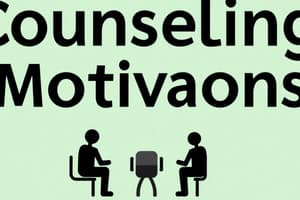Podcast
Questions and Answers
A potentially negative reason for becoming a counselor is when the counselor has a strong desire to empower the client.
A potentially negative reason for becoming a counselor is when the counselor has a strong desire to empower the client.
False (B)
Effective counselors are characterized by their ability to listen and convey understanding without judgment.
Effective counselors are characterized by their ability to listen and convey understanding without judgment.
True (A)
Self-awareness and acknowledgment of personal biases are irrelevant to a counselor's effectiveness.
Self-awareness and acknowledgment of personal biases are irrelevant to a counselor's effectiveness.
False (B)
Being sensitive to cultural differences is an important trait for counselors to achieve positive outcomes.
Being sensitive to cultural differences is an important trait for counselors to achieve positive outcomes.
Counselors with high self-esteem and a positive belief in themselves can influence the outcome of counseling sessions positively.
Counselors with high self-esteem and a positive belief in themselves can influence the outcome of counseling sessions positively.
An effective counselor derives happiness from external recognition and approval.
An effective counselor derives happiness from external recognition and approval.
Counselors are expected to develop personal relationships with their clients sharing meaningful material.
Counselors are expected to develop personal relationships with their clients sharing meaningful material.
A self-actualizing person is ego-centered and primarily seeks personal glorification.
A self-actualizing person is ego-centered and primarily seeks personal glorification.
Counselors must tolerate doubt and ambiguity while guiding clients.
Counselors must tolerate doubt and ambiguity while guiding clients.
Having a good sense of humor means a counselor must use hurtful jokes towards others.
Having a good sense of humor means a counselor must use hurtful jokes towards others.
Flashcards
Effective Counselor Traits
Effective Counselor Traits
Effective counselors possess qualities like empathy, active listening, and cultural sensitivity, allowing them to understand and support clients.
Counselor Motivation
Counselor Motivation
Motivation to be a counselor might stem from desires to help others, prevent problems, or assist individuals in reaching their potential.
Positive Counselor Qualities
Positive Counselor Qualities
Positive counselor traits include self-awareness, cultural sensitivity, and a belief in the client's capacity and worth.
Counselor Interpersonal Skills
Counselor Interpersonal Skills
Signup and view all the flashcards
Ethical Counseling
Ethical Counseling
Signup and view all the flashcards
Self-Actualizing Person
Self-Actualizing Person
Signup and view all the flashcards
Effective Counselor Qualities
Effective Counselor Qualities
Signup and view all the flashcards
Empathy and Compassion in Counseling
Empathy and Compassion in Counseling
Signup and view all the flashcards
Counselors' Energy & Risks
Counselors' Energy & Risks
Signup and view all the flashcards
Intimate Client Relationships
Intimate Client Relationships
Signup and view all the flashcards
Study Notes
Reasons People Become Counselors
- Most want to help others.
- Some want to help those less fortunate.
- Some want to prevent problems.
- Some want to help people reach their full potential.
Potential Negative Reasons for Becoming a Counselor
- Unrealistic expectations for helping others.
- Undermining client autonomy by doing for the client.
- Wanting to solve their own problems.
- A need to be powerful or influential.
Interpersonal Dimensions Affecting Counseling Outcomes
- Ability to listen and convey understanding without judgment.
- Ability to be sensitive, empathic, and patient.
- Ability to convey that the counselor values the client's experiences.
- Ability to convey the belief that the client is capable, trustworthy, respectable, worthy, and dependable.
Positive Counseling Outcomes (continued)
- Demonstrating a positive self-belief and self-esteem.
- Self-awareness of biases and prejudices.
- Analyzing one's own feelings.
- Sensitivity to cultural differences.
- Tolerance for ambiguity.
- Modeling appropriate behaviors.
- Altruism.
- Ethical conduct.
- Using oneself as a vehicle for change.
Continued Positive Counseling Outcomes
- Commitment to understanding specialized knowledge.
- Staying current in professional knowledge.
- Respecting client's worldview, experiences, spirituality, and culture.
- Maintaining good self-care strategies.
Characteristics of the Self-Actualizing Person
- Tolerance for doubt, uncertainty, and ambiguity.
- Honesty, genuineness, and self-acceptance.
- Internal motivation and drive focused on growth.
- Helping others out of genuine concern, not for recognition.
- Enjoying solitude and being unaffected by the stress of others.
- Deriving happiness from personal growth and internal rewards.
- Wonder about the world.
- Deep empathy and compassion for others.
- Deep and meaningful interpersonal relationships.
- Non-discrimination and acceptance of others' differences.
- High ethical standards.
- Having a good sense of humor (not hurtful).
- Unique creativity.
- Involvement in causes beyond oneself.
Additional Counselor Characteristics
- High level of energy and alertness.
- Taking risks and facing potential client rejection.
- Ability to handle ambiguity.
- Developing intimate relationships with clients.
Studying That Suits You
Use AI to generate personalized quizzes and flashcards to suit your learning preferences.




